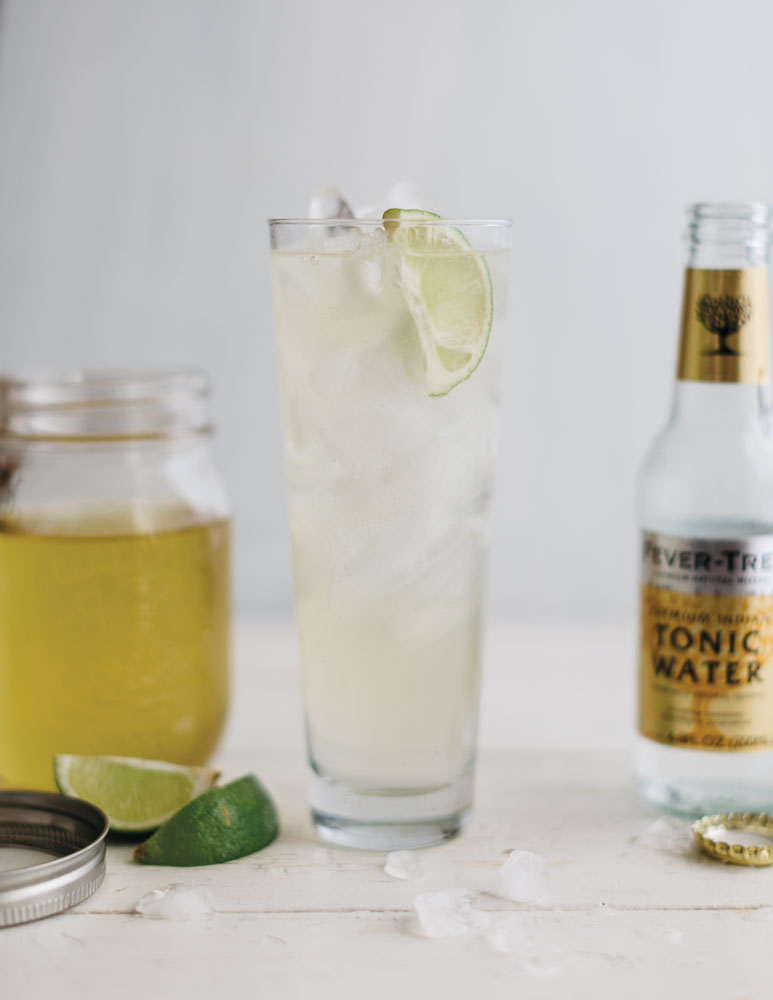DIY Gin & Tonic
Photo by Michael Piazza / Styled by Emmet Kelty
Many people associate the classic Gin & Tonic cocktail with summertime porch sitting. But the flavor profile of gin is really all about spring: It’s herbaceous, refreshing, a prelude to the warmer months to come.
Gin actually starts as a neutral spirit that gets flavored. What’s great is that you can make your own gin at home, to your liking. You actually build your gin flavors from a vodka base. Juniper berries are a must, but from there your creativity kicks in. We prefer gins that are less juniper-forward and more herbaceous than classic dry gins. Our house-infused gin is heavy on lemongrass, thyme and citrus.
The quality of the tonic can make or break your G&T. If you’re feeling ambitious, try making your own tonic syrup. Again, you can play with different spices, herbs and citrus to make it your own. There’s simply no comparison to the stuff that comes out of the soda gun behind the bar.
CLASSIC G&T
FOCUS: LEMONGRASS, THYME
2 ounces house-infused gin* or GrandTen Distilling American Gin 1 ounce homemade tonic syrup**
5 ounces soda water
1 lime wedge
Combine gin and tonic syrup in mixing glass, stir and pour over lots of ice in a Collins glass. Top with soda. Squeeze lime and place in cocktail. For extra flair, add a few juniper berries to your ice cubes before freezing.
*House-Infused Gin:
4 cups Berkshire Mountain Distillers Ice Glen Vodka
lemongrass stalk, roughly chopped
2 thyme sprigs
1 tablespoon sliced ginger
¼ cup juniper berries
1 tablespoon coriander seeds
5 cardamom pods
Peels of 1 lemon (avoid the white pith)
Place all ingredients in a pot. Turn the burner down as far as it will go and cook for 1 hour. (The cooking temperature should be no more than 140°. If your stove runs too hot, steep the mixture for 12 hours at room temperature instead. If you have a sous vide machine, even better.) Remove from heat and chill in the refrigerator for 2 hours. Strain into a large Mason jar.
**Homemade Tonic Syrup
The essence of tonic is cinchona bark, which is the source of quinine. It can be hard to find—you will most likely have to order it online—but check at your local health foods store, where they may be able to order it for you. It is toxic if you use too much, so please be careful. If you prefer to buy pre-made tonic, we recommend Q or Fever-Tree tonic water or Jack Rudy tonic syrup.
4 cups water
2 cups sugar
½ cup cinchona bark
1 cup roughly chopped lemongrass 1 lemon, peels and juice
1 lime, peels and juice
1 orange, peels and juice
1 grapefruit, peels and juice
1 teaspoon allspice berries
Place all ingredients in a pot and cover. Bring to a boil, then reduce the heat to as low as possible and cook for 20 minutes. (Again, you’re looking for a cooking temperature of no more than 160°. Sous vide is a great option to control the heat if you have the capability.) Remove from heat and let cool completely. Strain well.
This recipe appeared in the Spring 2017 issue as part of a larger story on Spring Cocktails.

